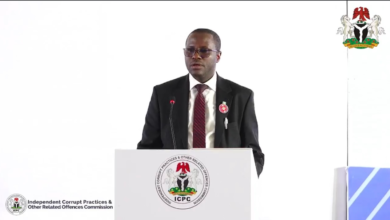APN Seeks Passage of Mental Health Bill To Curb Suicide, Attempted Suicide

Immediate past President, HEAWAN, Azoma Chike (Right), presenting HEAWAN’s Best Pharmacist of the Year Award to the representative of Pharm Sam Ohuabunwa, Pharm. George Okon, while the President, HEWAN, Chioma Obinna (Ist left) and Dr. Anthony Omolola watch in admiration.
The President, Association of Psychiatrists in Nigeria (APN), Dr. Taiwo Lateef Sheikh, has called for the passage of the Mental Health Bill that will decriminalize suicide and attempted suicide; promote mental well-being; prevent mental illness and ensure access to treatment of mental disorders.
He made the call while delivering a lecture titled “The Rising Incidences of Suicide: The Way Out,” at the 2019 Health Writers Association of Nigeria (HEWAN) Annual Symposium/Award Ceremony in Lagos at the weekend.
Dr. Sheikh said there is need to create enabling environment for mental well-being and suicide prevention through legislation, adding that mental health Legislation translates to enhanced mental well-being.
“Mental Health Legislation applies to the assessment, treatment, care and support of people experiencing mental disorder. A law to provide for mental healthcare and services for persons with mental illness and to protect; promote and fulfill the rights of such persons during delivery of mental healthcare and services and for matters connected therewith or incidental thereto,” he explained.
Dr. Sheikh said the basic principles of mental healthcare law include the promotion of mental health and prevention of mental disorders; access to basic mental healthcare; mental health assessments in accordance with internationally accepted principles and promotion of the least restrictive type of mental healthcare among others.
On the rationale for Mental Health Act, APN boss said, “in view of the severe deficiencies of the current State legislation and the lack of a national and comprehensive modern mental health act, several attempts have been made to enact a brand new national mental health act, which will apply in all states of the federation. The most current one is the 2019 ‘Mental Health and Substance Abuse bill” which has attempted to address many of the lapses observed until then and has included substance abuse.”
National Mental Health Bill 2019 (Mental Health and Substance Abuse Bill), according to him, is a “Bill for an act to provide for the enhancement and regulation of mental health and substance abuse services, protect persons with mental health needs and establishment of national commission for Mental Health and Substance Abuse Services, for effective management of Mental Health in Nigeria and other related matters.”
Mental well-being, he explained, is “the level of psychological well-being or an absence of mental illness. It is considered the state of someone who is “functioning at a satisfactory level of emotional and behavioural adejustment.” “It is a state of good health in which every individual realizes his or her own potential, can cope with the normal stresses of life, can work productively and fruitfully, and able to make a contribution to her or his community.”
He called on Nigerians to support the Bill to ensure that it is passed into Law.
On how to prevent suicide, he called for the blocking of access to respective means such as poison, potentially poisonous medication and insecticides, bridges, firearms and railways.
He called for increased community awareness programmes, these, according to him, usually imbed help-lines and public education at workplaces and schools to increase knowledge and reduce stigma.
According to him, “Every health worker or gatekeeper should be aware of the fact and be trained to react adequately; hospital-based surveillance to detect suicide attempts is still needed in the majority of low and middle income countries such as Nigeria”
He said people should come together to form self-help groups for bereaved relatives and survivors.
Dr. Sheikh advocated for online and telephone counseling by trained volunteers for provision of effective support, suggesting that professionals in primary care should be trained.





